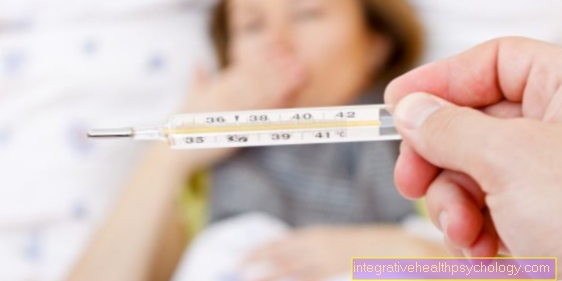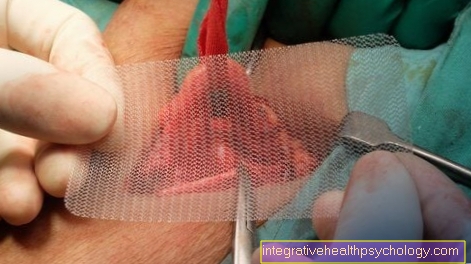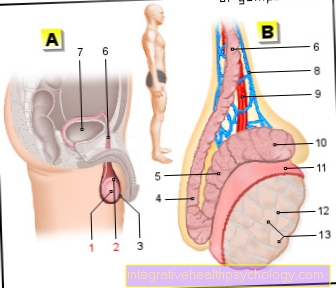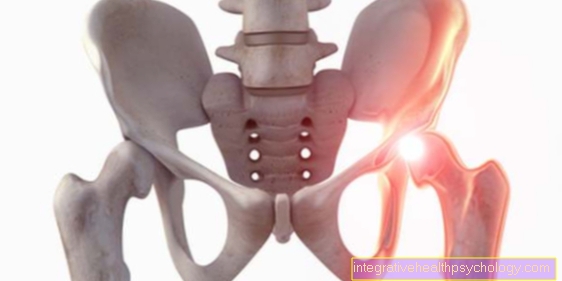Fever despite antibiotics - what to do?
What is a fever despite antibiotics?
First of all, a fever is a natural reaction of the body to a pathogen such as bacteria. The higher temperature means that the pathogens are combated more effectively. Often, however, an antibiotic is also necessary. An antibiotic is a drug that can kill the bacteria. The antibiotic kills the bacteria faster and more effectively than the immune system. Thus, the immune system can stop the defense reaction and the fever also drops again.
If the antibiotic does not work sufficiently or if the triggering pathogens are not bacteria but, for example, viruses, the immune system must continue to fight the pathogens and the fever remains.

How quickly do antibiotics work with a fever?
Antibiotics take effect relatively quickly, even if there is a fever at the same time. However, when taking antibiotics, the time intervals must be observed as closely as possible so that they can achieve their full effect. In addition, the onset of action depends on the form in which the antibiotic is taken. Outside the hospital, antibiotics are usually prescribed in tablet form, ointment, or drops. During an inpatient stay, the antibiotic can also be given via the vein, which has a better effect. Furthermore, the consumption of alcohol or dairy products can have a negative effect on the effectiveness of the antibiotic.
What can I do if the fever does not go away despite the antibiotic?
The first thing to do is to evaluate whether the antibiotic is being taken correctly and often enough. In addition, care should be taken to ensure that it is not taken with dairy products or alcohol (see also: Amoxicillin and milk - is that possible?). If the correct intake is ensured and the fever persists after about three days, a doctor should be consulted so that he can investigate further causes. It also helps to document your exact symptoms and their course well, as these can give clues as to why the antibiotic is not working.
Further helpful information can be found at: How can you reduce a fever ?, How do I know if my fever is contagious?
What can I do as an adult if the fever persists despite taking an antibiotic?
If a fever persists in adults for an unusually long period of time despite antibiotics, this can have various causes. First of all, one should make sure that the antibiotic has been taken properly. Then it should be asked whether the fever was triggered by a bacterial infection or whether another germ (e.g. virus or fungus) could be behind it. Then the antibiotic would not be effective.
If you assume a bacterial infection, another source of error can be the choice of the wrong antibiotic. Different germs respond better or worse to certain antibiotics. Depending on whether the patient was last hospitalized or had other risk factors (for example a chronic illness), different bacteria can be the most likely triggers. Determining the germ and its resistance can provide important information here. Resistance can be another reason for fever despite antibiotics. With the massive use of antibiotics, bacteria develop a resistance to certain drugs. Potential resistances must always be considered, especially in the hospital environment.
Finally, when choosing the antibiotic, it is important to consider where the drug should work. If, for example, there is an inflammation in the soft tissue, special antibiotics must be selected that can penetrate this soft tissue well so that enough active ingredient arrives at the infection site. If this does not happen, the infection can spread and the fever persists.
What can I do with a child if the fever persists despite the antibiotic?
If a baby or toddler has a fever for more than three days despite antibiotic therapy, a pediatrician should be consulted. The pediatrician will then evaluate why the fever is not going down. As with adults, possible sources of error can be the wrong intake, another non-bacterial germ or the wrong antibiotic.
This situation must be taken seriously, especially with babies, as the fever and possible refusal to drink can cause them to lose fluids quickly and do not have many reserves. In addition, other symptoms such as rash, sore throat and especially a stiff neck must be observed. A stiff neck suggests an inflammation of the meninges. This dangerous, but quite rare, clinical picture must be treated as quickly as possible with the right antibiotics. It is important that an antibiotic is chosen that also gets into the spinal canal. In order to achieve a sufficient effect, the antibiotic must also be given via the vein.
Read more on the subject at: What to do if your baby has a fever / Fever in a toddler
What can I do if the fever with pneumonia does not go down despite taking antibiotics?
Pneumonia can be caused by a wide variety of germs. Some of them are more common, others less often. In the case of pneumonia, an antibiotic would first be administered that matches the patient's history and that is effective against the most common pathogens. If special features such as hospital stays or a weakened immune system (for example due to a serious chronic illness) are known in advance, an antibiotic would be chosen from the outset that has a broader spectrum of activity.
If the fever persists after the third day and if the general condition deteriorates, treatment failure must be considered and a switch to other antibiotics must be made. In this case, the pathogen should also be determined in order to rule out that it is not a virus against which the antibiotic would be ineffective.
What can I do if the fever with a urinary tract infection does not go down despite the antibiotic?
In the case of a urinary tract infection, antibiotic therapy is chosen primarily according to the severity of the course and whether it is a complicated or uncomplicated inflammation - here the main factor is whether the urinary tract infection is the first time or more often, in a woman or a woman Man occurs. If there is also knocking pain in the flank, it is assumed that there is also an infection of the renal pelvis.
If the fever and other symptoms persist despite antibiotic therapy, the choice of antibiotic should be reconsidered. Determining the exact pathogen helps here, as not every antibiotic is equally effective against every germ. In addition, you always have to think about antibiotic resistance. A laboratory can determine whether a germ is resistant to a certain antibiotic.
What can I do if the fever with an otitis media does not go down despite the antibiotic?
An otitis media should only be treated with an antibiotic if the disease progresses very seriously or if risk factors are present. A severe course is accompanied by a high fever and a greatly reduced general condition. The antibiotic of choice is amoxicillin. However, it is known that patients who have received amoxicillin in the previous month do not respond well to the drug. This could then be the reason for the existing fever despite the antibiotic. You should then be given another antibiotic straight away.
In the case of otitis media, good ventilation via the ear trumpet is also important. Decongestant nasal sprays can be used here, for example, or possibly enlarged tonsils, known colloquially as polyps, can be removed. If this does not happen, the inflammation can easily return and lead to a permanent fever.
Read more on the subject at: Therapy for acute otitis media
What can I do if the fever does not go down after an operation despite the antibiotic?
A fever after an operation does not always mean a bacterial infection. For example, postoperative blood clots (thromboembolism) or large bruises can still cause a fever a few days after the operation. In this case, the fever develops even if the patient is given an antibiotic as a prophylactic. Of course, a fever after an operation can also indicate an infection.Inflammations of the lungs and urinary tract, as well as wound infections, are common here. Depending on which germ triggered this inflammation, the antibiotic given prophylactically may be ineffective. If you have a fever after an operation despite an antibiotic, research into the causes must be carried out in order to prevent dangerous complications.
Read more on the subject at: Fever after an operation





























